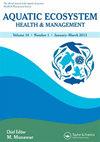Measuring 30 years of improvements to aquatic connectivity in the Greater Toronto Area
IF 0.8
4区 环境科学与生态学
Q4 ENVIRONMENTAL SCIENCES
引用次数: 5
Abstract
Instream barriers (e.g. dams, weirs and road crossings) fragment aquatic habitat and prevent the upstream movement of fish, impairing the ability of fishes to complete critical life stages, access critical habitat and for dispersal among local populations. Mitigation efforts have improved aquatic connectivity to some degree, but it has been challenging to quantify the overall improvement in connectivity without long-term and costly field assessments. The development of spatially explicit habitat connectivity indices make it possible to evaluate current stream connectivity, and quantify the improvement prior mitigation projects have had on connectivity. We combined a list of instream barrier mitigation projects completed in five watersheds in the Toronto (Ontario, Canada) area from 1987–2016 (mitigated barriers) and a previously established inventory of all known instream barriers in 2016 (current barriers). The cumulative improvement to connectivity was measured for potadromous (remain in tributaries) and diadromous (move between tributaries and lake) fish species using the dendritic connectivity index. Aquatic connectivity improved for diadromous species between 0 and 14.5% and for potadromous species between 0.1 and 4.4% in the five studied watersheds. Some variation in improvement among the watersheds can likely be attributed to differences in mitigation strategies among the watersheds and a historical emphasis on mitigating instream barriers to benefit migratory salmonid species.测量30年来大多伦多地区水生连通性的改善
河道内屏障(如水坝、堰和公路交叉口)破坏了水生栖息地,阻止了鱼类向上游流动,削弱了鱼类完成关键生命阶段、进入关键栖息地和在当地种群中传播的能力。缓解措施在一定程度上改善了水生生物的连通性,但在没有长期和昂贵的实地评估的情况下,量化连通性的总体改善一直是一项挑战。空间明确的栖息地连通性指数的制定使评估当前溪流连通性成为可能,并量化先前缓解项目对连通性的改善。我们结合了1987年至2016年在多伦多(加拿大安大略省)地区五个流域完成的河道内屏障缓解项目清单(缓解的屏障)和之前建立的2016年所有已知河道内屏障清单(当前屏障)。使用树状连通性指数测量了溯河鱼类(保留在支流中)和溯河鱼类物种(在支流和湖泊之间移动)连通性的累积改善。在所研究的五个流域中,溯河产卵物种的水生连通性提高了0至14.5%,河产卵物种提高了0.1至4.4%。流域之间改善的一些差异可能归因于流域之间缓解策略的差异,以及历史上对缓解河流内障碍以造福迁徙的鲑鱼物种的重视。
本文章由计算机程序翻译,如有差异,请以英文原文为准。
求助全文
约1分钟内获得全文
求助全文
来源期刊

Aquatic Ecosystem Health & Management
环境科学-海洋与淡水生物学
CiteScore
1.70
自引率
0.00%
发文量
1
审稿时长
18-36 weeks
期刊介绍:
The journal publishes articles on the following themes and topics:
• Original articles focusing on ecosystem-based sciences, ecosystem health and management of marine and aquatic ecosystems
• Reviews, invited perspectives and keynote contributions from conferences
• Special issues on important emerging topics, themes, and ecosystems (climate change, invasive species, HABs, risk assessment, models)
 求助内容:
求助内容: 应助结果提醒方式:
应助结果提醒方式:


